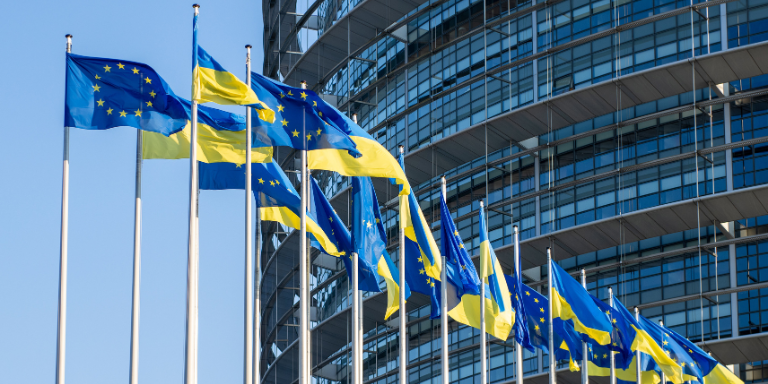Civil society calls for the EU’s Ukraine Facility to prioritise the Partnership Principle and environmental conditionality
Today, Bankwatch together with Ecoaction (1) and Razom We Stand (3) submitted initial comments to the European Parliament, urging the integration of the Partnership Principle and environmental conditionality in the legislation on the Ukraine Facility.
20 July 2023

The proposed Ukraine Facility, slated to be the EU’s financing instrument for providing modernisation and recovery support to Ukraine from 2024 to 2027, represents a crucial opportunity to foster green reconstruction and pave the path for Ukraine’s accession to the EU. Recognising the significance of this initiative, civil society representatives have highlighted the need to draw upon the best practices of existing EU instruments, such as the Recovery and Resilience Facility.
They are calling for a thorough integration of the European Code of Conduct on Partnership, a set of standards proven to be effective in promoting public participation and engagement. Civil society is best placed to provide the checks and balances for planning, implementing, monitoring and evaluating the reconstruction of Ukraine. To that end, involvement of civil society at the earliest stage is crucial, especially in light of the weakening of public consultations amidst martial law in Ukraine.
Svitlana Romanko, founder and director of Razom We Stand, says: ‘A post-war rebuilding of Ukraine’s economy that’s based on clean energy and aligns with EU climate goals will save us money in the long run and help Ukraine eliminate its dependence on fossil fuel imports. It’s of utmost importance that Ukraineadopts a green taxonomy, because every euro invested will bring Ukraine closer to energy independence and economic vitality. It will also help the country meet the clean energy goals set out in the European Green Deal, the Paris Agreement, the RePowerEU plan, and other EU policies and international agreements. In this way, Ukraine can become abeacon of success, inspiring the world to create a more peaceful and climate-friendly future.’
Valeriya Izhyk, EU policy officer at CEE Bankwatch Network, says: ‘Ukrainian civil society is faced with the unprecedented challenge of having to balance urgent war-related action with well thought-out strategic planning for EU accession. The Ukraine Plan is urgently needed for the country to meet this challenge head on. The European Code of Conduct on Partnership can bring structure to this dual objective by providing civil society with an effective tool to leverage progress. The Code sets out the membership criteria and procedures for monitoring committees, the bodies that will oversee the implementation of the Ukraine Plan’s operational programmes once they have been approved. This is exactly the type of governance architecture we need to ensure national ownership of the Ukraine Plan.’
Olga Polunina, executive director of Ecoaction NGO, says: ‘Now is the time to start planning the reforms and investments to be included in the Ukraine Plan – guided by Chapter III of the proposed Ukraine Facility – and to determine how civil society will be involved in its development. To ensure an inclusive and transparent approach, consultations should be held not only with business associations and entities, but also with civil society. But if previous attempts at developing a Ukraine recovery plan are anything to go by, this is likely to be an uphill battle. It’s equally important that both the Ukraine Plan and the Ukraine Facility safeguard environmental standards during reconstruction, especially given the suspension of environmental assessments for reconstruction work during martial law.’
Despite the Facility’s stated objective of aligning Ukraine with the European Green Deal and supporting the country’s green transition, the proposal lacks the minimum requirements for environmental sustainability and fails to specify a climate expenditure target. The Facility should not undermine any other EU legislation with which Ukraine is expected to comply. This includes the country’s obligation to apply provisions in the EU’s Regulation on the Governance of the Energy Union and Climate Action to the development of its National Energy and Climate Plan in a transparent and participatory manner.
Civil society representatives are emphasising the urgent need to incorporate such conditionalities, milestones and targets into the new regulation. A focus on environmental considerations will not only align the Facility with the objectives of the European Green Deal, but also ensure a sustainable and resilient future for Ukraine that is free from fossil fuels.
Contacts:
Valeriya Izhyk
EU Policy Officer, Ukraine reconstruction, valeriya.izhyk@bankwatch.org
Jason Kirkpatrick
Senior Communications Manager, press@razomwestand.org
Oleksandra Khmarna
Head of Communications, okh@ecoaction.org.ua
Notes for editors:
(1) The Centre for Environmental Initiatives – Ecoaction – is Ukraine’s largest environmental NGO. Uniting the efforts of experts and activists with the goal of protecting the environment and the climate, Ecoaction advocates for a fossil-free energy transition, clean air, and the sustainable development of energy, transport and agriculture in Ukraine. In 2022, Ecoaction published a set of principles designed to guide Ukraine’s green recovery. The initiative has received the support of more than 50 Ukrainian civil society organisations. https://en.ecoaction.org.ua/
(2) Ukrainian group Razom We Stand, founded at the beginning of Russia’s war in 2022, is campaigning to end the war by cutting Russian exports of fossil fuels. It has consistently called for a comprehensive and fully enforced embargo on Russian fossil fuels as well as a green reconstruction of Ukraine with the aim of providing a cleaner and brighter future for the country.
Never miss an update
We expose the risks of international public finance and bring critical updates from the ground – straight to your inbox.
Institution: EU
Theme: Reconstruction of Ukraine
Location: Ukraine
Project: The post-war Reconstruction of Ukraine
Tags: EU | Ukraine's recovery | reconstruction of Ukraine
